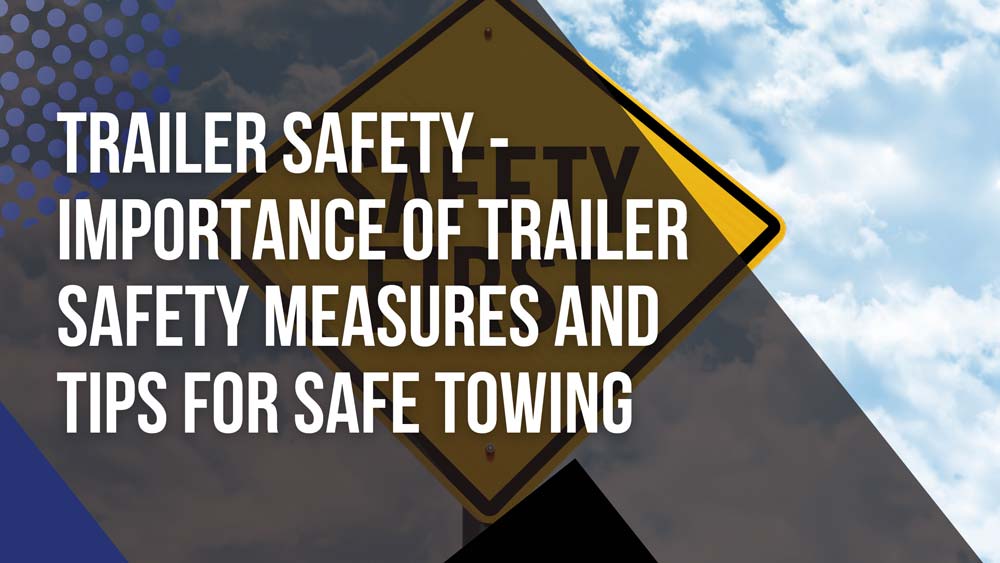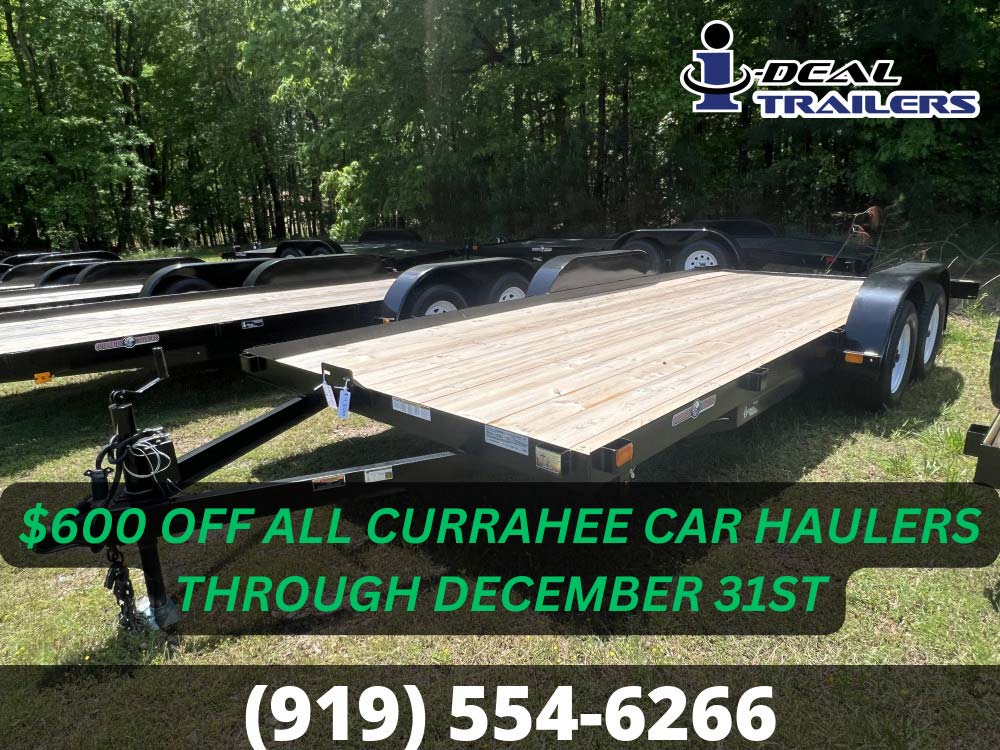Trailer Safety: Importance of trailer safety measures and tips for safe towing

As 2024 approaches, many people are beginning to plan their family vacations and
outdoor adventures for the year. For those who own trailers, this means gearing up
for a season of towing and hauling. While trailers can provide an incredible amount
of convenience and freedom, it is crucial to remember the importance of trailer
safety measures.
Every year, there are countless accidents involving trailers that result in serious injuries or even death. In fact, according to the National Highway Traffic Safety Administration (NHTSA), nearly 50% of all fatal trailer accidents involve rollover incidents. This alarming statistic only emphasizes the need for understanding and following proper safety protocols while towing a trailer.
In this blog post, we will explore why trailer safety should be a top priority for any owner or operator of a towed vehicle.
Every year, there are countless accidents involving trailers that result in serious injuries or even death. In fact, according to the National Highway Traffic Safety Administration (NHTSA), nearly 50% of all fatal trailer accidents involve rollover incidents. This alarming statistic only emphasizes the need for understanding and following proper safety protocols while towing a trailer.
In this blog post, we will explore why trailer safety should be a top priority for any owner or operator of a towed vehicle.
Understanding Trailer Safety: A Necessity for All Towing Enthusiasts
Trailer safety is more than just a set of guidelines—it's a responsibility that comes with owning and operating a trailer. The importance of adhering to these safety measures cannot be overstated.
When neglected, the consequences can be dire, posing a threat to the operator's life and the well-being of others on the road. Most people tend to underestimate the complexities of towing a trailer. Mastery of your vehicle's handling, being aware of the added length and weight, and understanding how these factors alter your driving style are all integral parts of safe trailer operation.
Furthermore, ensuring your trailer is in good working condition before embarking on your journey is equally crucial. Remember, safety on the road is everyone's responsibility. By being conscientious about trailer safety, you actively contribute to a safer driving environment for everyone.
Understanding the Weight Limit of Your Vehicle and Trailer
Any trailer owner must understand the weight limit of both the vehicle and the trailer. Overloading is a common mistake that can lead to dangerous situations, including brake failure, tire blowout, or loss of control. The weight limit, also known as the Gross Vehicle Weight Rating (GVWR), comprises not only the weight of the vehicle or the trailer itself but also the weight of all the passengers, fuel, and cargo. The vehicle's weight limit is typically found in the vehicle's owner's manual or on a label inside the driver's side door frame. The trailer's weight limit, on the other hand, is often listed on the trailer itself or in its corresponding owner's manual. To avoid accidents caused by overloading, it is necessary to be aware of these limits and respect them at all times. It's a good practice to weigh your loaded trailer at a commercial scale to ensure you are within the safe operating limit.Remember, understanding and adhering to the weight limits is essential for safe trailer operation and a crucial step towards ensuring a safe journey.
Ensuring Proper Hitch and Coupler Connection
An essential aspect of trailer safety is ensuring that the hitch and coupler connections are correct and secure. The hitch is the device attached to the towing vehicle, while the coupler is the part of the trailer that connects to the hitch. Together, they form a crucial link between your vehicle and the trailer, carrying the weight of the load and enabling the trailer to follow the vehicle's path. Incorrect hitching could lead to the trailer detaching mid-journey, causing dangerous situations or accidents.To ensure this connection is secure, begin by selecting a hitch that matches the trailer's weight and the towing vehicle's capacity. The hitch should be properly mounted and secured to the towing vehicle.
The coupler should be carefully lowered onto the hitch ball and locked into place. Cross-check that the locking mechanism is engaged and use a pin or lock to prevent accidental disconnection. Connect the safety chains in a crisscross pattern under the hitch, allowing for sufficient slack for turns.
Do not forget to attach the electrical connections for the trailer lights and brakes. Regularly inspect the hitch and coupler for any signs of wear, damage, or corrosion, and replace them if necessary.
Remember, a properly connected hitch and coupler are fundamental to a safe towing experience.
Checking and Maintaining Tire Pressure
An often overlooked aspect of trailer safety is the importance of maintaining proper tire pressure. Underinflated or overinflated tires can lead to blowouts, poor handling, and even accidents. For this reason, tire pressure should be checked before each trip and periodically on long hauls.The correct tire pressure for your trailer can usually be found either in your trailer's owner's manual or on a sticker on the trailer itself. Use a quality tire pressure gauge to check the pressure. Remember that tire pressure can change with temperature, so if you are traveling from a cool to a warm climate (or vice versa), adjustments may be necessary.
If tires are underinflated, not only is there a higher risk of a blowout, but it can also lead to higher fuel consumption since underinflation increases tire rolling resistance. Overinflated tires, while increasing fuel efficiency, compromise the grip between the tire and the road, making the vehicle more difficult to control.
Always ensure tires are cold (not driven on for at least three hours) when checking and adjusting tire pressure to get the most accurate reading. Regularly inspect your tires for signs of wear or damage, and replace them as needed.
A good rule of thumb is to replace trailer tires every three to five years, regardless of tread depth. By maintaining proper tire pressure, you're ensuring safer towing conditions and prolonging the life of your tires.
Utilizing Safety Chains and Breakaway Cables
Safety chains and breakaway cables are essential components of the trailer's safety system. They act as a fail-safe, providing an additional line of security between the trailer and the towing vehicle.Safety chains are designed to keep the trailer connected to the vehicle, even if the hitch and coupler connection fails. The chains should be crossed under the hitch and attached to the towing vehicle. The chains should have just enough slack to allow for a full range of motion during turns, yet be short enough to lift the coupler off the ground if the trailer and vehicle become separated.
The breakaway cable is a device designed to apply the trailer's brakes in the unlikely event that the trailer becomes detached from the vehicle while moving.
The cable is attached to the towing vehicle at one end and to the breakaway switch on the trailer at the other. If the trailer and vehicle become disconnected, the cable pulls the switch, applying the trailer's brakes and helping to bring it safely to a standstill.
Regularly inspect your safety chains and breakaway cables for signs of damage or wear, and replace them if necessary. Remember, the proper use of safety chains and a breakaway cable is not just a good practice—it's a legal requirement in many jurisdictions. So, never underestimate the role of these key safety measures in ensuring a secure and safe towing experience.
Properly Balancing Cargo in the Trailer
Properly balancing the cargo inside your trailer is an essential aspect of trailer safety. The distribution of weight within the trailer can significantly impact the trailer's stability and handling while on the road. To ensure a safe and smooth towing experience, follow these guidelines:- Center Weight: Aim to load heavier items towards the center of your trailer. This helps to keep the center of gravity low, enhancing stability and reducing the risk of the trailer tipping or swaying during transit.
- Front-Heavy Loading: Load your trailer so that 60% of the weight is closer to the front of the trailer and 40% towards the back. This distribution maintains downward pressure on the hitch, improves vehicle and trailer connections, and makes the steering more responsive.
- Secure Your Load: Use tie-downs and straps to secure items, preventing them from shifting during transport. Shifting weight can affect the balance of the trailer, causing it to sway or become unstable.
- Even Distribution: Distribute the load evenly from side to side. An uneven side-to-side weight can cause the trailer to lean, affecting your ability to control the towing vehicle.
Remember to never exceed the maximum payload of your trailer (the total weight that your trailer can safely carry). Always verify that the combined weight of your cargo and trailer doesn't exceed the maximum towing capacity of your vehicle.
By properly balancing the cargo in your trailer, you can significantly reduce the risk of accidents, ensuring a safe and comfortable journey.
Conclusion
The safe operation of trailers begins with proper hitching. But that's not the end of the story, and continued safety depends on maintaining proper loading, securement, and driving techniques. It's critical to follow all safety guidelines when towing a trailer to avoid accidents and ensure the well-being of drivers, passengers, and other road users.Safe trailer operation is much more than just being mindful of speed limits and not making sudden stops. It's a holistic process that requires adequate training, awareness of the load capacity, understanding the road and weather conditions, and adhering to state and federal regulations.
So, let's commit ourselves to observing all trailer safety measures every time, without fail. The adage that prevention is better than cure couldn't be truer in this case. By following safety measures, we can prevent personal injuries, fatalities, and
About Us
Are you looking for a reliable company to buy a trailer for your next project? Look no further than I-Deal Trailers. We are a family-owned and managed business based in Wake Forest, NC. And we have everything you need in terms of trailers, whether it is a utility trailer, a dump trailer, or even a gooseneck trailer. We’ve got you covered.We also help provide financing options to our clients. You can reach us at (919) 554-6266 or fill out our contact form to learn more.

